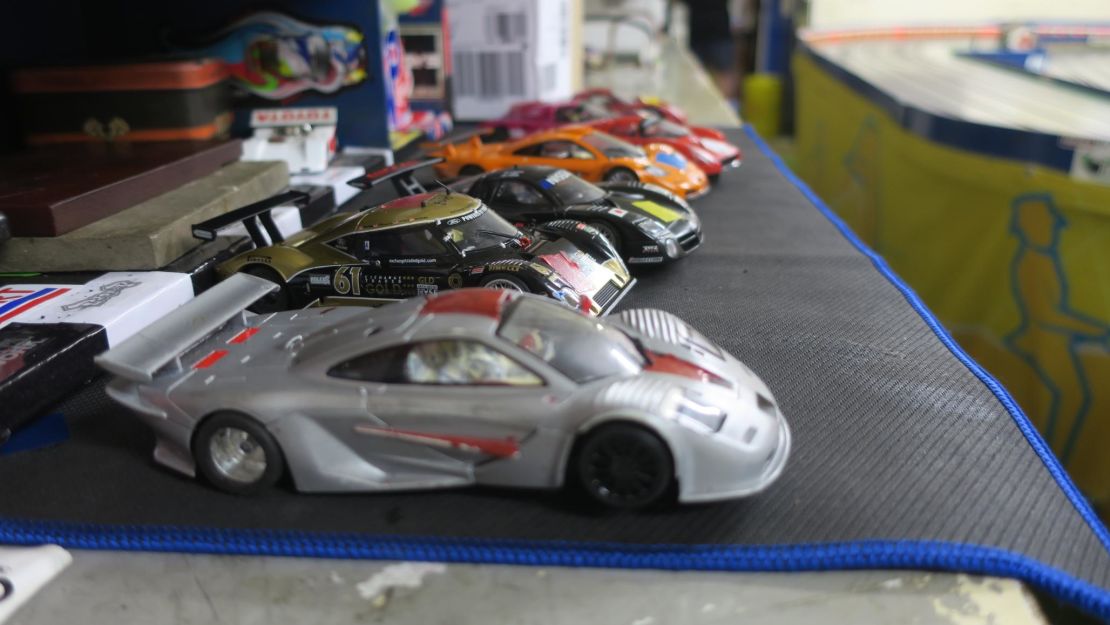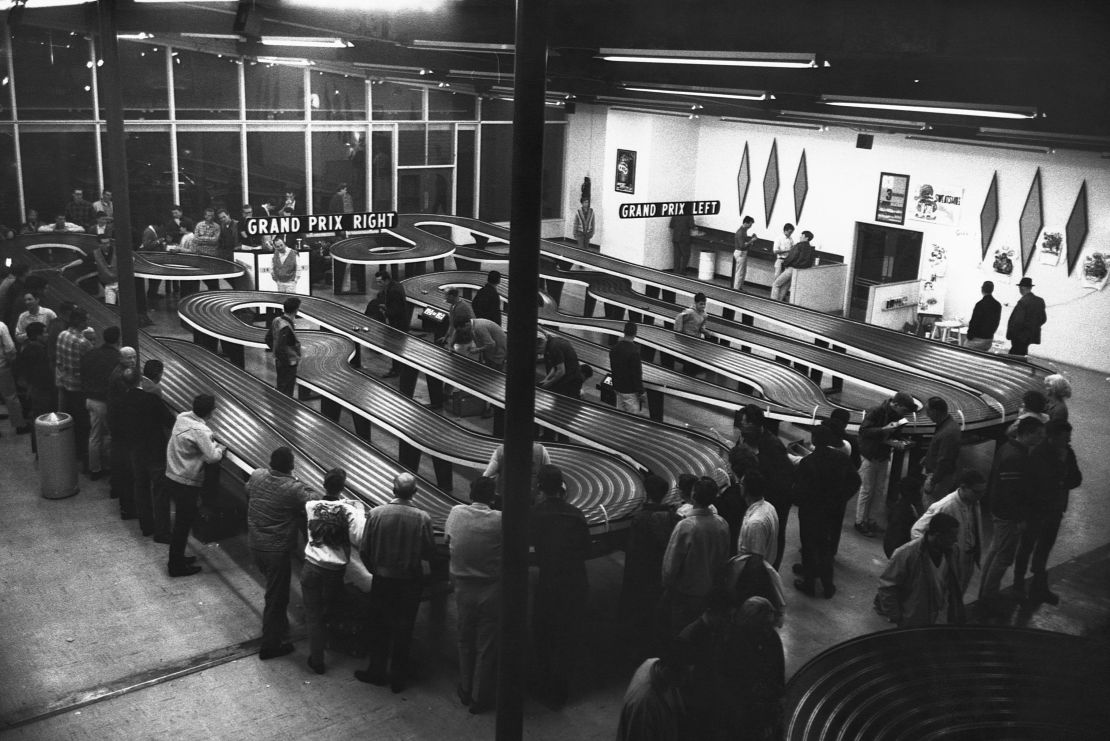He’s 87 years old, but Londoner John Chance-Reed is still into racing cars.
The ex-navy serviceman, now hard of hearing, is adept at accelerating down the straight, and easing up on corners so that his car doesn’t careen off the grid.
But when the inevitable wipe out does happen, it’s never fatal. He simply picks up his plastic electric car and slots it back on the racing track.
“Go at your own speed, don’t try and follow other people,” Chance-Reed advises, his words dripping with 60 years of racing wisdom.
Chance-Reed is the oldest registered member of the British Slot Car Racing Association (BSCRA), a collection of enthusiasts in a sport that enjoyed its heyday in the 1960s and now skews heavily towards men at or near retirement age.
Most began as teenagers racing Scalextric sets, a popular British slot car brand still around today.
Some maintained their passion and introduced it to their kids, to varying success, while others rediscovered slot car racing later in life.

‘You can’t get it out of your system’
It’s the combination of speed – cars can surpass 20 mph (32 kph) – and “making the cars look pretty” that keeps racers hooked, says Paul Harwood, who, at the spry age of 51, won all his club’s trophies last year.
Skills are honed on and off the track, where racers tweak cars by replacing tires, treating metal conductors and checking the balance of a car.
“It’s not big engineering,” says BSCRA chairman Mark Witham, who explains that winning often amounts to “an accumulation of small gains.”
Witham, 66, is quick to note that the association is firmly about competing, not collecting, though he does admit to keeping “only a couple of dozen” cars at home.
Unlike true sports car racing, which is taking on new levels of female participation, nearly all but “one or two” BSCRA members in the UK are men, he admits.
“I guess it’s that girls don’t get given Scalextric sets to start with,” says Witham.
Like most racers who are married, Witham says his wife’s feelings towards his obsession are to “tolerate it good-naturedly.”
Others simply say their wives are happy to have them out of the house for a few hours a week.
Nick Thrower, who at 64 has been racing for half a century, is one of them.
“It’s the kind of thing where once you’ve done it, you just can’t get it out of your system,” Thrower says. “You keep coming back.”
Using a workshop in his garage which “migrates to the kitchen in the winter,” Thrower spends 10 to 15 hours a week working on slot cars, taking them apart and putting them together from scratch.
“This gives people all sorts of skills, like construction skills, motor skills, how to tune a motor, how to paint a body shell, how to drive the thing,” he says. “I just love driving them, I think they’re fantastic.”

Silverware and bragging rights
Like roller rinks, bowling alleys and bingo halls, slot car racing venues began fading in England and the US with the rise of real estate prices and competition from video games.
Numbers peaked at 3,000 public slot car tracks in the US in the mid 1960s, according to the Los Angeles Times. Today, Southern California has just one remaining after the recent closure of a track in Santa Clarita.
In the UK, tracks are confined mostly to local clubs – many of them just about hanging on.
On a recent rainy night in Finchley, north London, eight slot car racers gathered at the North London Society of Model Engineers, a dingy premises equipped with a kitchenette and racing room dominated by a winding four-lane track that stretches 90 feet (over 27 meters).
As the pungent smell of a blown-up car wafts in the air, there is hardly enough room between the track and the surrounding walls to allow the four racers to squeeze onto the podium and take their positions.
The society was formed in the late 1960s, and much of the vintage equipment migrated to Finchley from its previous home in 1982. The racers all know each other – some for 35 years – and good-natured ribbing is the rule, not the exception.
“I’ve been racing since the ’50s,” says elder statesman Chance-Reed. “1850s,” shoots back a competitor.
Each pay about $100 in membership fees a year to keep the club running. Members come armed with several slot cars – mostly scaled to 1/32 in size – and a gun-shaped controller. Cars and controllers start at $75 each, but costs can rise considerably for fancier models.
At the local club level, nothing but silverware and bragging rights are really at stake.
Points are tallied in different categories, including Formula One, saloon and sports cars, with the winner in each division lifting a “sarcastic trophy” at the end of the year.

‘Things start falling off’
Some Finchley club members have gone on to race at the British nationals, and even the World Championships run by the International Slot Racing Association, set for Finland this October and England next year.
Brian Church is a former British national champion, winning the Formula One event in his prime at age 45.
Now 68, Church sold his eyeglass lens-making business a few years ago, but still maintains private clients – and a love for slot car racing.
The sport is no different from any other, he explains. It takes a combination of hand-eye coordination and experience to win.
“Once you get to mid-fifties, things start falling off,” Church says. “Your reflexes are not as sharp as they were when you were younger.”
A racer’s job is to carefully squeeze the “gas” trigger, which releases a current. It is very easy to lose control on curbs, and cause a wipe out, as this writer found out.
As a result, members waiting their turns are assigned corners – much like baseball’s first and third base coaches – to reposition cars that skid off the track.

A dying sport?
The Finchley club includes one member, 28-year-old Matthew Bottoms, who is one of the few remaining slot car regulars under 30 in the country.
John Ovens, another Finchley member, raised his son Michael on his own, and turned him onto slot cars at an early age.
By the time Michael was 12, he was scooping up trophies – eventually winning three national championships in the club and saloon categories at the “novice” level.
So where is Michael on this night in Finchley? Why isn’t he racing among his peers?
“He’s dropped it now that he’s 30,” explains his father. “He’s into women, having a good time, getting drunk, and whatever else.”
BSCRA chairman Witham concedes that extinction could be on the cards.
“I think it’s the danger that all old sports and hobbies of this sort go through,” he says. “Computer games have stolen a lot of people who would come.”
But his sport offers something video games don’t, he says: A social life.
New members “like getting together and meeting people and having a social (night) out,” he says, “rather than knocking (consoles) around their spare bedrooms.”














